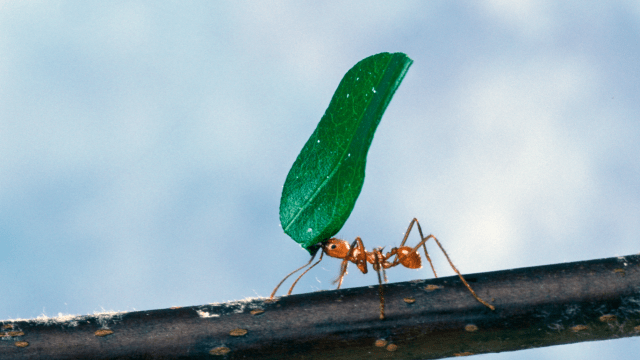New research shows that garbage piles produced by leaf-cutter ants emit significant amounts of nitrous oxide—a potent greenhouse gas.
Chemical reactions within the organic waste piles produced by leaf-cutter ants create copious amounts of the greenhouse gas nitrous oxide, according to new research published today in Proceedings of the Royal Society B.
These industrious insects aren’t contributing to global warming on the scale of human activities, but their behaviours are fundamentally altering the composition and function of tropical forests—including the way nutrients are transported and recycled.
Leaf-cutter ants are dominant herbivorous insects that are ubiquitous throughout Central and South America. These insects can suck out the sap from leaves for a quick energy boost, but the real purpose of harvesting leaves is to the feed the fungus that grows in their nests. Leaf-cutter ants are insectoid farmers, growing fungus to feed their colonies.
Incredibly, leaf-cutter ants can remove up to 8 per cent of living forest foliage each year, making them true movers and shakers of the environment, influencing both forest structure and function.
But like any industrial-scale process, this farming activity results in waste. Leaf-cutter ants don’t like to leave garbage lying around, so they’ve developed a system whereby dead fungus, rotting leaves, and the remains of dead ants are plopped atop a dump away from the colony. This behaviour creates a kind of compost heap filled with organic matter, setting the table for some complex chemistry. The carbon and nitrogen packed within these churning clumps of waste interact to produce a surprising amount of nitrous oxide, as the new research shows.
For the new study, entomologist Fiona Soper from the University of Montana (now at Cornell University in New York) and her colleagues travelled to a tropical rainforest in southwest Costa Rica. Soper’s team studied the garbage piles produced by Atta colombica, a species of leaf-cutter ant. In total, the researchers measured the emissions from 22 colony refuse dumps across a 4 square kilometer area.
Results showed that each pile was a nitrous oxide hot spot in the tropical forest. Individually, these waste sites don’t produce a huge amount of greenhouse gas, but collectively they do. The team estimates that 350 grams of nitrous oxide are produced per hectare each year, which surpasses “background emissions by more than three orders of magnitude,” the researchers wrote in the study, adding that the levels were comparable to “engineered systems such as wastewater treatment tanks.”
These nitrous oxide hot spots produce gas at rates far greater than anything that could be produced without the intervention of ants, such as topography or soil moisture, the researchers wrote.
It’s important to point out that the study was limited to a small geographical area; the amount of gas produced at other leaf-cutter ant sites may vary. In the future, scientists should conduct similar surveys in other parts of Central and South America to learn more, and to calculate the total global contribution of nitrous oxide emissions made by leaf-cutter ants.
As the researchers wrote in the study, leaf-cutter ants “may represent an unrecognised greenhouse gas point source throughout the Neotropics.”
As noted, the amount of nitrous oxide produced by these ants isn’t likely to affect global climate, but it’s clear from this study that ants, despite their small size, are a veritable force of nature.
